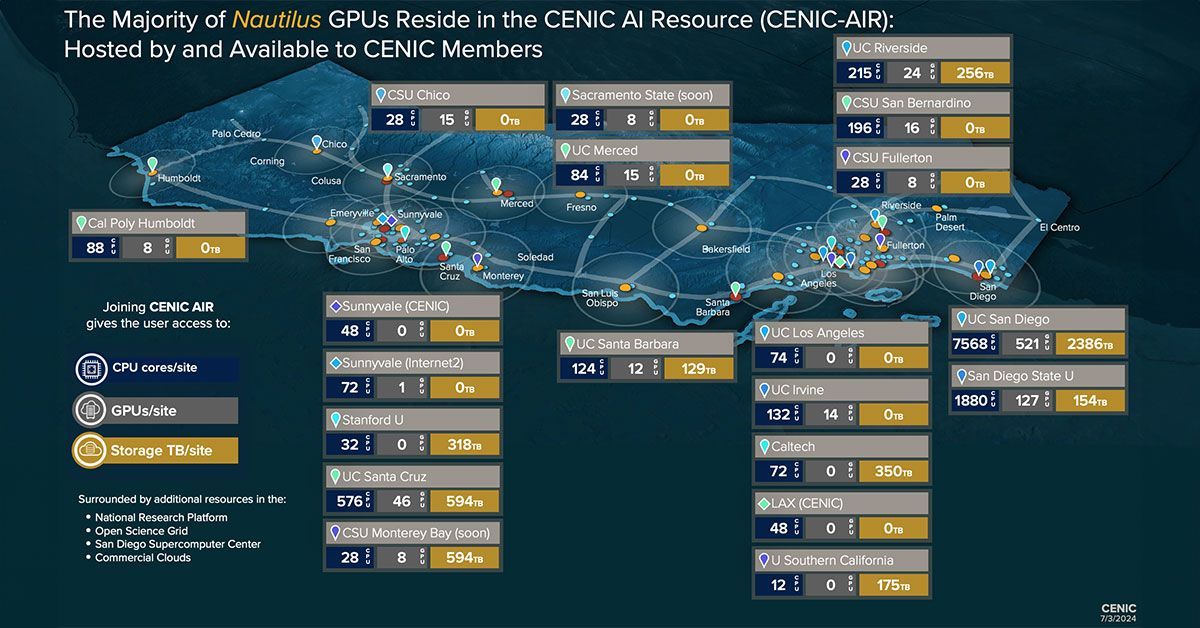San Diego Supercomputer Center and CENIC Work to Expand AI Education Infrastructure in California
Media contact:
Published Date
Article Content
The San Diego Supercomputer Center (SDSC) at UC San Diego and the Corporation for Education Network Initiatives in California (CENIC) have developed a prescient AI education infrastructure called CENIC AI Resource (CENIC AIR) for K-12 education, public libraries, community colleges, the California State University (CSU) and the University of California (UC) campus systems.
“Artificial intelligence and machine learning present new career possibilities for today’s students. These next-generation academics and innovators will be able to move more seamlessly through and between the different segments of public education. CENIC AIR was devised in anticipation of the impacts these future leaders will have on society, and we are passionate about being a key part of it,” said Frank Würthwein, director of the San Diego Supercomputer Center.
UC San Diego’s retired Distinguished Professor and CENIC Board Member Larry Smarr, Würthwein and representatives from San Diego State University (SDSU) and the San Diego Community College District (SDCCD) recently presented details about the collaborative CENIC AIR program to CENIC’s Board of Directors. The reason for this collective push was to bolster support for the CENIC AIR program in terms of wider engagement within the state and potentially beyond it.
Currently, there are nine CSU campuses, plus Miramar College within the San Diego Community College District, with CENIC AIR users:
- CSU San Bernardino
- CSU Fullerton
- CSU Monterey Bay
- CSU Northridge
- Cal Poly Humboldt
- Cal Poly Pomona
- San Diego State University
- San Jose State University
- Sacramento State University
- Miramar College
According to Thomas DeFanti, retired UC San Diego research scientist currently serving as a principal investigator at the Qualcomm Institute on campus and as senior Research Networks advisor to CENIC’s CEO Louis Fox, the presenters shared the CENIC AIR FAQs with board members before the meeting. Providing this context also included connecting CENIC AIR to the California CENIC-connected contingent of the National Research Platform (NRP), which extends across the United States and is led by Würthwein.
DeFanti remarked on the enthusiasm board members showed during the meeting. “Of particular interest was the involvement of CENIC Engineering in helping campuses set up and, if they want, manage their Science DMZs, a critical infrastructure requirement for Nautilus – the NRP's distributed computer system – to function.”
DeFanti also noted that UC San Diego is the primary institution behind the NRP. “UCSD grants have bought most of the computers and storage that make up CENIC AIR and the NRP," he said. “Other campuses are adding compute nodes and storage. NRP's big advantage is that SDSC and its partner University of Nebraska-Lincoln provide operations for everyone, so hiring other technical experts is not necessary for campuses to do.”
CENIC AIR was originally suggested by Jerry Sheehan, currently chief information officer (CIO) of the Salk Institute, when he served as CIO at SDSU and received a U.S. National Science Foundation Campus Cyberinfrastructure grant (CC* grant) to substantially add to Nautilus for several CSUs to use. The Technology Infrastructure for Data Exploration (TIDE) Project, also an SDSC-SDSU partnership, extends the CENIC AIR resource beyond SDSU to three additional CSU campuses: CSU San Bernardino, Cal Poly Humboldt and CSU Stanislaus.
After CENIC awarded a 2024 Innovations in Networking Award for Equitable Access to Cyberinfrastructure (CI) to the TIDE Project earlier this year, Fox said, “It is always gratifying to see how our members use the CENIC network as a platform to advance research and education and, in doing so, inspire other segments and create new opportunities for them which in turn motivates the CENIC team to advance our networks and services.”
The San Diego Supercomputer Center and the Halicioğlu Data Science Institute together compose the new School of Computing, Information and Data Sciences (SCIDS) at UC San Diego. SCIDS meets a critical need in modern society to transform data into actionable knowledge across disciplines to advance data science, AI education and research, and technology.
Learn more about research and education at UC San Diego in: Artificial Intelligence
Share This:
You May Also Like
Stay in the Know
Keep up with all the latest from UC San Diego. Subscribe to the newsletter today.




